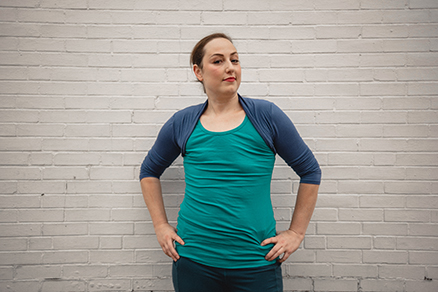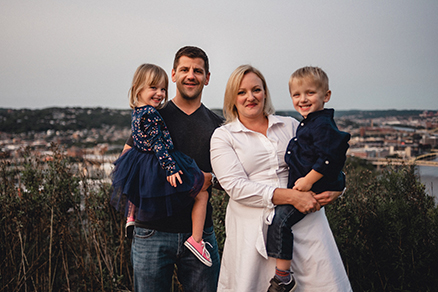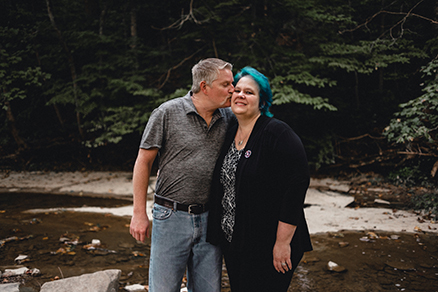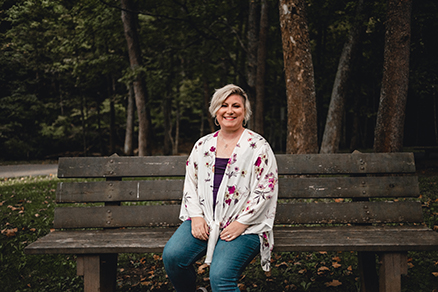Kim




What is it like to be a young breast cancer survivor? Throw in parenting two small kids during a pandemic, medical battery after kitchen sink cancer treatment, and running a nonprofit into the mix and you have the recipe for my life these last three years.
I don’t normally write about the details of my cancer experience, or of my private emotional struggles - it’s just too personal. But to understand why young breast cancer survivors desperately need the support of organizations like YWBCAF, there's nothing quite like an immersive experience. An inside look at what's essentially a normal life… but punctuated by traumatic memories and filtered through the lens of cancer survivorship - a lens that brings everything into sharp focus, whether you can handle it or not.
You wake up groggy and sore from another night of restless sleep interrupted by hot flashes and prematurely aged joints from chemo and hormone therapy. Feel irritated at having the last years of your youth stolen from you… and then guilty, because at least you're still alive. You're lucky, that's a fact. You wish you had the energy to go for a jog, but at 7am you're already exhausted. Chug your coffee, get your 5 and 7 year old children fed and clothed, take care of the pets, do endless loads of laundry and dishes, make the grocery list, prep the food for the day. Climb the stairs for the twentieth time and feel sad about your wasted muscles and crappy fitness level… but grateful to be able to climb those stairs instead of crawling like you had to on chemo. Deep breath. Let it go.
Ignore the pile of work on your to-do list for your nonprofit, for now, because the kids need you. Answer 10,000 existential and scientific questions from two eager, relentlessly inquiring little minds. Make numbers and phonics worksheets for the 5 year old to help her understand the basics of humans language. You know, no big deal. A is for apple. B is for bolus. C is for cancer. Practice reading, writing, and math with a highly resistant 7 year old who can't sit still - get it done, but also be patient and creative to foster his love of learning. It's an impossible task that you couldn't have anticipated being responsible for. Try not to berate yourself for being mentally slower than you were in your old life, before cancer came along, crushing the plans you had for your life like a critter under the wheels of a semi truck, absolute death and destruction in its wake unnoticed as it barrels on. Deep breath. Let it go.
Talk to your friends online - you can't talk to them in person anymore, it's too risky. Try to comprehend and remember the details of their lives, not just because you care (you do) but because female friendships require detailed emotional engagement and none of your friends would understand how hard it is to process this stuff with a post-chemo swiss cheese brain. Catch up on current events so you can be a productive member of society and an informed voter. Feel existential fear and dread about the current public health crisis (cancer patients are higher risk) and our national leadership's negligence causing the viral spread to spiral out of control. Remind yourself that you have your family's passports in order and feel better momentarily... until you remember that most other countries have closed their borders to Americans. Because we are plague rats. Deep breath.
You're not safe here. Cancer patients are high risk, and no matter how careful you are, you could end up in the ICU with COVID. You wonder how all those hundreds of thousands of victims of the pandemic felt being told they were going to have to be put on a ventilator now. Struggling to breathe. Knowing they probably wouldn't wake up, ever again. Hearing that from an ICU doctor in a hazmat suit, alone, quarantined away from their families. Remember when you closed your own eyes on the OR table, drawing a deep breath, accepting that this sterile operating room with the masked surgical team buzzing around your prone, weak, bald body might be the last thing you ever see. Deep breath.
Learn from an email that your husband's employer health plan is being terminated. Try to process what that means for you with a keen awareness that the only reason your cancer treatment didn't bankrupt your family, is because of this employer's benevolence and the luck of the draw. Make a mental list of all the different healthcare providers you see on a regular basis since diagnosis - medical oncologist, surgical oncologist, physical therapist, primary care, OB/GYN, psychiatrist, survivorship specialist. You will have to call them to make sure you can still see them. How hard will it be to find a new doctor during a pandemic? Seven new doctors? Feel mentally exhausted thinking about it. Deep breath.
Pack up lunch for everyone and take the kids out on a creek hike. They need exercise to stay healthy, but parks, pools and indoor spaces are out of the question... and no seeing friends. The summer heat is particularly intolerable with the extra 30lbs of body fat you now carry since your encounter with chemopause. You still have to carry the 30lb backpack of snacks, water and supplies, and on the way back add to that your 40lb kid with a skinned knee - good thing you sprung for that XXL toddler carrier. Which reminds you about the last woman you knew with kids younger than yours who died recently from metastatic disease. Chastise yourself for feeling sorry for yourself over inconsequential things like the heat and having to carry your healthy child. At least you still can carry her. At least she still has a mother. Don’t cry in front of the kids. Deep breath.
Come home and collapse. Try to decide what task to tackle next. More school work? Both kids are way behind. More laundry, dishes, cooking? It never ends. Project a, b, or c for the nonprofit? It's nearly impossible to focus on intellectual work while also caring for two small children. Prioritize - what's more important, responding to the traumatized woman across the country who (like you, two years earlier) just woke up from surgery with a skin sparing mastectomy she didn't consent to, caretaking of your other family members who are beyond stressed out, giving the kids their overdue haircuts, the never ending household drudgery, the yard work, the kid's schoolwork?
Do you even exist as a person anymore? You can't even remember a time when you were able to pay attention to your own needs. What does "self care" mean during a pandemic when you have zero access to child care? It's 5pm and you still haven't done a single thing on your nonprofit task list. Will you have any intellectual capacity left after all of your other work is done? Since chemo, your intellectual clarity is a precious commodity and it's rarely accessible when you actually have "free time".
Your mind latches on to the feminist outrage. Is this why patriarchy perpetuates - because women just keep doing the domestic duties? What's your responsibility as a female role model to your children? Are you failing your children? Will you ever have time to think about what *you* want, or need, ever again, or will the cancer have the last laugh? Your friends who were stolen from their families by cancer would give anything to have these problems. Deep breath. Let it go.
Young women can and do get breast cancer. And when we do, we are often already stretched to our limits with school, marriage or partnership, young children, careers. Like a waitress balancing two huge platters who suddenly finds herself on a soccer field having to play goalie while still balancing the damn platters. God forbid you falter and spill someone's coffee... and if you let that ball into the net, it's game over.
I was diagnosed when I was 35, raising a maniacally precocious 3 year old and a 10 month old baby with IBHS (involuntary breath holding spells). I did have a family history, but I was told by three different PCPs that because it was on my dad's side it didn't matter and I wasn't high risk. I later learned that this was completely wrong and that I should have been receiving screening MRIs every 6 months starting in my mid-20s. I also learned that breastfeeding is not protective, and that for about 15-20 years postpartum, women are actually at an increased risk for breast cancer. Like so many other young survivors I know, my OB initially told me that my lump was just a clogged duct. Luckily for me, I’m an a**hole patient and I insisted on an imaging script - because it turned out that the cancer was already stage 3A, in my lymph nodes, and aggressively HER2+. I finished my "kitchen sink" cancer treatments almost two years later.
Organizations like YWBCAF serve a critical function: they ensure that young women are empowered to a) understand our breast cancer risk, b) self-advocate both for screening and for treatment once diagnosed, and c) access the support services we and our families need so desperately to manage during and after treatment. Thank you to Jen, to all who support YWBCAF's mission, and to all of the organizations who YWBCAF has partnered with over the years to provide support for young women with breast cancer. Women like myself. We'd be lost without you. Thank you!




